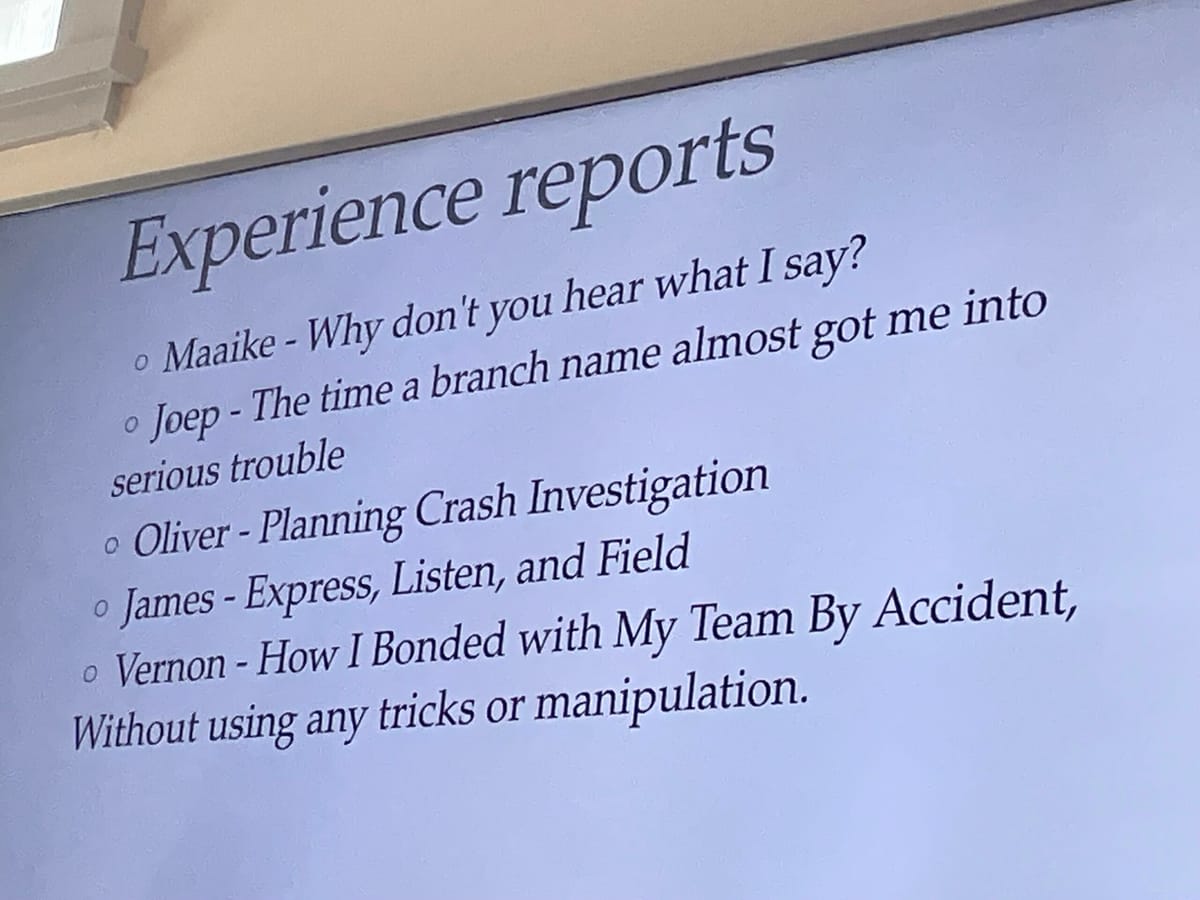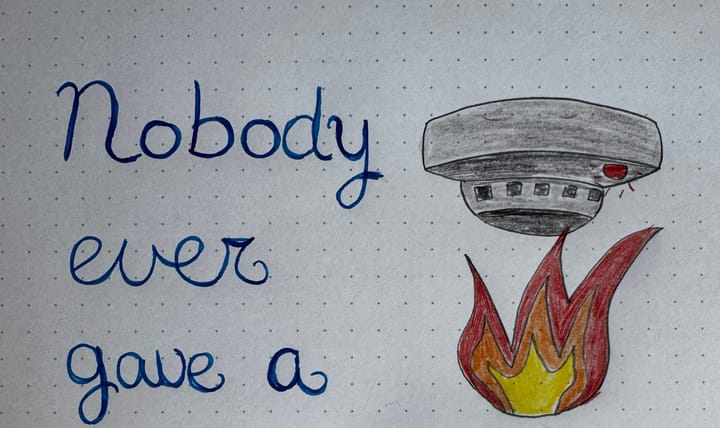Why don't you hear what I say? (LLEWT 2024)

LLEWT 2024 was a peer conference with the theme “communication” that happened a few weekends ago in North-Wales. Dear reader, it was quite the trip to get there! A boat, an extremely shitty English hotel and a long car ride later we finally arrived in Wales. It took us about 28 hours to get there by car.
My experience report was the first of the day, which meant that everybody was fresh and caffeinated. We talked about my report for 2.5 hours, and I’m especially grateful for Elizabeth Zagroba’s suggestions on what I can do differently next time. This woman has the amazing ability to process things that are told to her and craft actionable tips out of them on the spot. A truly rare skill to behold. Take note, people (especially white men)!
The tips she gave me all had to do with my experience of not being heard at work.
In my experience report, I zoomed in on one particular “incident” at work that made me wonder why a white man did not listen to me when I presented him with irrefutable proof of a bug that his team had caused. This guy had the gall to deny the existence of the bug, and it made me feel like I had taken crazy pills. If facts don’t matter anymore, what does?
Did he not want to hear what I said because:
- I’m a tester
- I’m a woman
- I’m neurodiverse
- I’m not politically well-versed
- All of the above
Let me expand a little on all the options on offer.
Tester: we are bringers of reality. Our main task is not to find bugs, but to inform stakeholders of all relevant information. Often, this information isn’t exactly good news.
In the case of this particular experience, I had judged the bug as quite severe, yet easy to fix. That’s why I brought him this information (his team literally failed to put a constraint on a database field, that would be the fix. That they neglected to do it is another matter, but that wasn’t my concern at that moment. I judged the fuck out of them inside my head, but I never made that part of the discussion).
Anyway, for some reason or another that I cannot understand, some people really have issue with listening to anything a tester says. We can be seen as a nuisance, a destroyer of sadlines, while we are, in fact, just the messenger. In my experience, it’s often the people that have the most riding on making the sadline that experience the most cognitive dissonance when a tester comes to them with a grave look on their face. They know what’s up and want nothing to do with it.
Woman: Furthermore, as a constant stream of doubt, I always worry whether people don’t hear what I say because I’m a woman. In the case of this particular experience, I recruited a bunch of white men that did believe my story to get this guy to fix the bug. That counts as proof in this case, if you ask me. Woman + tester might be an even tougher combo. If you are a different flavor of minority, you can substitute that wherever I’m writing “woman”. Woman is just a variable, not a constant. (It is a constant in my life, but you get my drift, hopefully.)
Neurodiverse: Maybe this is too much of the same point, as it is another flavor of being a minority. Honestly, I don’t even know if I’m neurodiverse, as I have not been tested officially. You’d also think that being neurodiverse is an asset in IT. I have never had much issue with working with my peers in the team, most of those folks are neurodiverse themselves. It’s when I have to leave the safety of the team and go to the management layer that I start running into issues. I only have one modus operandi when it comes to talking about information that came from testing: enthusiasm. I talk about bugs with fervor because bugs are great!
In the case of this particular bug, it was a fine specimen. I felt like Sherlock Holmes for uncovering it. You see, it wasn’t my job to find this bug, but as a mobile tester I have learned the hard way that I’m actually more of a backend tester if I want to protect the quality of the mobile app. The user doesn’t give a rats ass if a bug in a mobile app is not actually caused by the app, but on the backend side of things. I was sick and tired of receiving one-star ratings that we couldn’t do anything about. So, you bet your ass that for this new functionality I was testing the whole fucking chain. That’s how I found this fine specimen of a bug, by manipulating systems that were like 3 or 4 layers removed from our app. The garbage there would show on our frontend, and it would highly confuse the user in this case.
Anyway, I’m not going to lie, I was proud of my find. That’s why I immediately went to that team manager and enthusiastically told him about what I had found. Stupidly, I assumed that he would also be thrilled by my finding. That was probably my mistake. I assumed other people also loved bugs and technical details, but some people…..don’t. He was insulted by my enthusiasm 😂. I could not get to his level of communication. I do: memes, sarcasm, enthusiasm. I don’t do: management-speak. Read the room, I did not.
Politically-versed: Whether I’m neurodiverse or not, I do know that I can miss the mark completely with my communication style. Some people love my sense of humor, sarcasm, memes and enthusiasm for bugs, while other people cannot for the life of them tell whether I’m serious or not. They mistake my humor for me not taking anything seriously, but that is not the case! I need to cope with the ridiculousness of office life by taking a stab at it, but at the same time, I do care about reaching our goals.
Those were my main hypotheses for not being heard. Which one counts the most? Am I mistaken completely?
The thing is: you can never be sure. A lot of it cannot be A/B tested, although there’s always the option of changing your approach.
With the help of Elizabeth’s tips, in the future I’ll try:
- taking time before communicating and responding.
- formulating different types of responses. Maybe an e-mail is a better medium. Maybe writing down what I’m going to say and then going for the conversation will lead to different results.
- finding allies who can do the communicating for me, when my own style would not suffice.
On the other hand, we also concluded that:
- some people are just assholes. In this instance, I’m still highly convinced that this team manager utterly failed his one job. His ego got in the way. The bug was easy to fix, but he was too butt-hurt to just accept that.
- the answer is not always that I have to change my style. Seeing that a lot of people also enjoy my style and humor, I don’t have to go out of my way to change for the people who don’t like it. (Believe me, I tried that at one point and I just got very unhappy at work. It’s okay to need humor and memes in your life.)
If any of my LLEWT attendees are reading this, what did I forget here? So much was said, but as I was answering your questions I could not take notes at the same time!
Other LLEWT 2024 blogs:
James



Comments ()